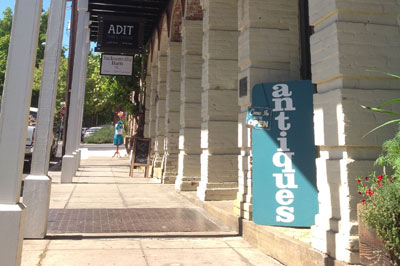Editorial by Jacksonville Review Publisher Whitman Parker
On June 23, Jacksonville Mayor Paul Becker issued a proclamation regarding the use of “sandwich board” signs used by some of the city’s merchants. At this writing, the Jacksonville code and sign ordinance states that the use of such signs is not permitted, although certain exceptions have been made by the City Council in recent years. It should be pointed-out that the current city code has been undergoing a major re-write for nearly 2 years, and that little clarity and much confusion still exists. In certain cases, interpreting today’s codes and ordinances is difficult and sometimes requires professional expertise to fully comprehend. One of the proposed code changes involves the use of banners and sandwich board-type signage in front of businesses in order to attract more customers.
It’s no secret that for many “off-California Street” merchants, attracting people to 3rd, 4th, Oregon, “C” and other streets can prove challenging. The use of attractive sandwich boards, chalk boards and other low impact “advertising” methods is critical to bringing customers in and supporting their businesses.
Recently, the City Council approved the use of banners and balloons as part of marketing efforts for the Taste of Summer Celebration. The City Council has also taken a hands-off approach to zoning enforcement pending final code review and adoption which, when complete, should provide clarity along with standards for the use of these types of marketing activities.
On June 20, without prior notice to the Mayor or the City Administrator, a member of the Planning Department staff reversed course and instigated enforcement action to remove sandwich boards at several businesses located on South Oregon Street. According to my conversation with Planning Director Amy Stevenson, the enforcement action was in response to a complaint filed by City Councilor Jocie Wall, who phoned the Planning Department about a sandwich board sign outside the new Angelica Day Spa at 260 S. Oregon Street. A police officer was then dispatched to the spa and then to the Orth Building at 150 S. Oregon Street, home of Sterling Creek Antiques, Jacksonville Barn Company, Adit Public House and La Fiesta Restaurant. At both locations, the business owners complied with the police officer’s request and removed the signs. In my opinion, the matter should have never reached such dramatic heights and the police should not have become involved.
Joelle Graves, proprietor of Sterling Creek Antiques, told the Review, “On Friday when the police officer entered my store to tell me to remove my sandwich board on my front stoop, I thought to myself, Oh no, not today.” Graves, who says she follows the code and doesn’t make a habit of breaking the law, followed the officer’s instructions and brought the sign inside, as ordered. “My business day came to a screeching halt at that point,” she said. Graves, like many merchants in every part of the city, knows that signage can make a big difference, including the use of the controversial sandwich boards. This is especially true for a building such as the Orth Building, which houses several businesses that are partially shielded from view due to architectural elements such as posts, beams and overhead awnings.
Graves added that, “What made this even more frustrating for me is that I had already discussed the code with the Planning Department and understood the issue…they had told me they were working on a new sign code and that sandwich boards were prohibited. The Planning Director had told me that if my board was placed on the stoop, off the sidewalk, out of the way, that it would be allowed until the new code was completed and ready. That was a year ago…I’ve been patiently waiting for the new code ever since.” Until this Friday, all was working well. In the Review’s opinion, the signage complaint filed by the councilor should have been handled by sending a simple email note or text message to the Planning Director. This action represents a lack of common sense on the part of the councilor and demonstrates poor judgment.
Following the police order, Graves immediately reached-out to the Jacksonville Review and members of the Chamber of Commerce. Graves sits on the Board of Directors for the Chamber. Officers from the Chamber of Commerce in cooperation with other business leaders expressed their concern to city officials, including Mayor Becker. Thankfully, Graves’ message resonated with the mayor who then issued a 60-day grace period for the signage in question. The mayoral order also included instructions for the Planning Department and City Council to resolve this code matter within 60 days.
While discussing the matter with Mayor Becker, he voiced frustration on how the matter was handled in the first place. The mayor noted that the councilor failed to follow protocol – which states that councilors should first bring matters to the Mayor or City Administrator and not staff, especially support staff who are not ordinarily authorized or in a position to make these sorts of decisions. The Mayor also voiced frustration that involving the police was “a complete waste of resources.”
Mayor Becker says he’s committed to resolving this issue shortly and expects to see the matter on the Planning Commission and/or City Council agenda in July. In his proclamation, he stated, “the use of sandwich boards is a time-honored tradition older than the city itself…they have a positive impact on merchant sales…they add a certain energy to the vitality of the area…without altering the landscape as do fixed signs.”
The Review wholeheartedly supports Mayor Becker and is grateful for his leadership and support of the business community.
Respectfully,
Whitman Parker, Publisher
The above commentary is the opinion of the Jacksonville Review which welcomes your input on this matter and invites you to post constructive comments here. Please note that the Review does not post anonymous comments.

 Whitman Parker is Owner and Publisher of Jacksonville Review and Southern Oregon Wine Scene magazines.
Whitman Parker is Owner and Publisher of Jacksonville Review and Southern Oregon Wine Scene magazines.